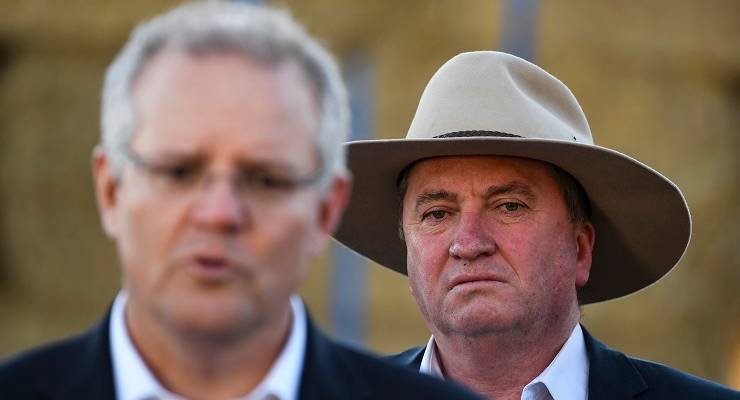
Remember when Scott Morrison had unprecedented authority as prime minister?
It wasn’t just after the election last May, when journalist after journalist spoke of “once-in-a-generation authority“, “that rarest and most inscrutable of political assets“, “a rare opportunity to craft an agenda for a new government and a vision for a continent“.
As late as September, Morrison had, according to The Australian‘s Dennis Shanahan, “the most stable leadership, the strongest party unity, the least internal dissent, the clearest policy prescription and the best political strategy of any government in 30 years.”
The Guardian‘s Katharine Murphy was a rare voice to call bullshit.
Now the headlines, even at cheerleader publications like the Oz, are of the “humiliation” of Morrison yesterday by the likes of Barnaby Joyce and other renegade Nationals over the deputy speakership going to Nats defector Llew O’Brien.
How has the man with “once-in-a-generation authority” and “the least internal dissent … in 30 years” get “humiliated” by a climate denialist who left the deputy prime ministership in a sex scandal amid unresolved sexual harassment allegations?
As is often the case, the media overstates things. Morrison never had as much authority as journalists claimed, but nor was he exactly “humiliated” yesterday.
Morrison’s post-election authority always came with the caveat that he only fell over the line into majority government. Ever since, he’s been a couple of byelections or a Nationals rebellion away from losing a vote on the floor of the Reps.
That happened yesterday over a ballot for the deputy speakership, a position 99% of voters wouldn’t know existed, and 100% wouldn’t care about if they did.
Ever since 2016, Labor has been very good at exploiting the tight numbers on the floor of the House to embarrass the government, but it matters mostly to people inside Parliament House, not outside it.
If Morrison’s “authority” and “humiliation” are linked by that two-seat margin in the House, they’re also linked by one of the key lessons of the past 18 months of federal politics: unity doesn’t matter.
The old saw “disunity is death” looks as dated as Bob Hawke’s America’s Cup jacket. Voters now have a ready tolerance of disunity — after all, they elevated Scott Morrison to a parliamentary majority despite the farcical circumstances of his ascent, when even Morrison himself called it a “Muppet show”.
But Morrison is not the only beneficiary of that: Barnaby Joyce and his fellow denialists know there is no electoral price to be paid for constant destabilisation, shambolic internal brawling and leadership shenanigans.
Far from “blowing the joint up”, Joyce and co have learnt that you can remain in government despite the kind of disunity that would have been regarded as profoundly toxic just a decade ago.
This is perhaps why Joyce and co aren’t even waiting to destabilise Michael McCormack. The declarations of loyalty issued in the wake of McCormack’s win now look soooooo last week.
Joyce isn’t one for Doing You Slowly, it seems; it’s leadership instant noodles for the member for New England, with the clear threat that the destabilisation and the headlines of “humiliation” will continue until McCormack caves is.
And they’re even less reluctant to hurl bombs at soyaccino-sipping inner-city chattering class elitists in the government like Trent Zimmerman in their quest to accelerate the warming of the planet with more coal.
If the government had any sort of agenda, things might be more problematic, with the possibility that key legislation could be be defeated by rebellious Nats.
But what little agenda the government had is vanishing — its entire economic policy, a return to a small surplus this year, is now being spoken of in the past tense; less “back in black” than highway to hell after the summer. Llew O’Brien’s threat to not support legislation rings a bit hollow if the government doesn’t have much important legislation to put before parliament.
But Morrison should hope no Liberals reach the same conclusion as the Nationals and realise that, especially when the parliamentary numbers are so tight, there are few, if any, consequences for disunity.








No electoral penalty for disunity in the Coalition, but I have a feeling it might be different if the ALP were as disunited as the government is.
Yes indeed, Curmudgeon. The headlines would read “Labor split” taking up most of the front page.
No electoral penalty for disunity in the Coalition, but I have a feeling it might be different if the ALP were as disunited as the government is.
Might be only a matter of weeks rather than months before we see those time-honoured indicators: (1) pic of PM fortuitously under an ‘Exit’ sign; (2) PM trapped into mouthing those inherently ambiguous words, ‘I’m not going anywhere’.
“unprecedented authority” – as defined and granted by “journalist after journalist”? Don’t go to close to that edge.
These “independent” mickybulls running around like mavericks – will run back home for feeding time. They’re only doing it to impress Hansonites.